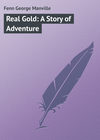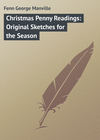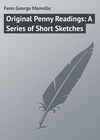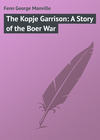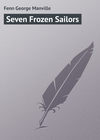Buch lesen: «Stan Lynn: A Boy's Adventures in China», Seite 14
For a few moments the soft grey smoke hung before the lad’s eyes and hid what was going on; but he did not waste time. Throwing out the empty cartridge, he began to fit in another, and as with trembling fingers he reclosed the breech he whispered sharply:
“Did I hit?”
“I fancy so; the man sprang up in the air and fell backwards. You’ve no time to look, so take it from me. They are carrying the man away.”
Stan drew in his breath with a hissing sound, but no time was given him to think of what he had done, for Blunt’s voice made him start, as he was bending over him.
“Loaded?” he said.
“Yes.”
“Take aim, then, at that man with the match. He is shifting the gun a little to allow for the distance the junk has floated with the stream.”
“Yes; I see.”
“Let him have it, then. Sharp! He must not fire that piece.”
Stan’s rifle rang out, and the Chinaman dropped behind the high bulwark and was seen no more.
“Load again, stupid!” cried Blunt, for Stan half-knelt behind the opening from which he had aimed, looking stunned and motionless, impressed as he was by his terrible success. But he started into active life again under the spur of his companion’s fierce words.
“Keep on firing slowly and steadily, Lynn,” said Blunt in tones which made the lad feel that he must obey, though the compunction was dying and he knew how necessary it was to render the big piece useless by checking the efforts of the gunners.
He fired again just in the nick of time, and the man who now held the linstock dropped it and stood gesticulating to his companions.
“You’ve missed him, Lynn,” said Blunt angrily. “Look! he has picked it up again.”
Stan needed no telling that he had only startled the gunner by sending a bullet close to his head, and before he could fire again a puff of smoke darted from the mouth of the piece, and Blunt struck him sharply across the back, spoiling his aim so that the bullet from his rifle went anywhere.
“Why did you do that?” he cried sharply, for the blow stirred him into making an angry retort, as he gazed through the smoke at his comrade. “I’ve done the best I could. I’m not used to this sort of – Why – what – Mr Blunt!” he cried, as he saw a peculiar look in the manager’s face, and that he was leaning sideways against the wall of bales. “Oh! you’re hurt!”
The manager tightened his lips and nodded sharply before letting himself subside, gliding down half-resting against the defensive building, and saving himself from falling headlong in his faintness.
“Here,” cried Stan, letting his rifle rest on the top of the bale from which he had fired, “let me bind up the wound. Where are you hurt?”
“Hah!” exclaimed Blunt, as if mastering a spasm of pain. “Never mind me. Go on firing, my lad. Don’t you see how close they are in? Fire away, and shout to the others to keep it up. Stop them from loading if you can; it may scare the next junk from coming on. – Ah, that’s better!”
For the sounds he heard were pleasant to his ears. There was no need for Stan to shout, and he took up his rifle again in obedience to his orders and went on aiming at the men on the junk who seemed to be most prominent. Firing was going on all around, and from the upper windows of the warehouse as well, the consequence being that the men at the sweeps fell one by one; and then the two men handling the huge steering-oar dropped away, with the result that, instead of the great junk being laid alongside of the wharf for the pirates crowding her to leap ashore, they were carried on down-stream, with her captain and officers raging frantically, till the chief man received a bullet through one of his upraised arms and sank back into the arms of a subordinate.
Chapter Twenty Six
“Fire Away!”
The leading junk was soon some distance down the river, the confusion on board from the steady rifle-fire, which caused man after man to drop, checking all efforts to recover the lost ground; but the second junk had taken its place, and those on board were pouring in a hot fire from two clumsy swivel-guns, consisting of showers of rough missiles, bullets, broken iron, and the like.
But little damage was done to the sheltered defenders, who, animated by the example set from the little bastion, kept up a steady, regular fire, with certainly more than half the shots telling among the Chinamen working the guns or giving orders.
In the intervals of his firing, however, Stan kept on imploring Blunt to let him summon help, or cease firing and attend to the injury.
“Go on firing, as I told you,” cried the wounded man in an angry snarl. “Can’t you see that you are helping me by what you are doing.”
“But you must be getting faint.”
“I am,” said Blunt fiercely, “with the hard work to keep you at work. Do you think I want our men to be put out of heart because I am bowled over?”
“No,” said Stan, with his cheek against his rifle-stock, and he pulled the trigger, sending a leaden messenger at one of the enemy who was about to lower his smoking linstock, which produced a savage yell by its effect; for the man with the burning match flung up his hands, the linstock went flying overboard, and Stan’s frown deepened as he felt that he had desperately wounded the gunner, who was being borne away before the lad’s rifle was again charged.
“That was another hit, wasn’t it?” said Blunt anxiously.
“I think so,” was the reply, “but I’m not sure that it was my shot.”
“Never mind so long as it’s one murderer the less. Keep on firing, my lad, while you can get so good a chance. I can’t see what the rest are doing. It seems to me that they are only wasting powder.”
“Oh no,” said Stan; “men on the junk keep on falling. But there are two more junks coming close up.”
“And you haven’t checked them. Fire away! Try and hit the steersmen.”
“It’s hard work to see them so as to pick them out,” said Stan, “but I’ll do my best.”
The lad’s best was to aim carefully at the men holding the steering-oars of the second and fourth junks, but excitement combined with the distance affected the steadiness of his aim, and he uttered an impatient ejaculation as he saw the two great crowded vessels coming steadily onward.
“We shall be having all three close in together,” he muttered. “It’s impossible to keep them off.”
But better fortune had attended his efforts than he had given himself credit for. In each case his carefully aimed shot had taken effect, and they were supplemented by the shattering fire kept up by the defenders at the other loopholes. Certainly the third and fourth junks were coming in fast, but it was in an ungoverned way, and their action soon after produced a savagely furious volley from the captain of the second junk; for its companions came on to crash into it, with the accompaniment of falling masts and sails, and the confusion of top-hamper, a good deal of which came down upon the men, who yelled shrilly and angrily until they were extricated or able to get free.
In spite of the faintness and sinking caused by his wound, Blunt held tightly on by the cord binding the bale against which he had propped himself, and watched everything that took place with swimming eyes, but an intense feeling of satisfaction as he witnessed the disasters of the attacking pirates. And every now and again when the noise grew less overpowering he hurriedly went on giving his companion instructions to take careful aim at this one and that of the enemy’s force, and did not fail to give praise when the shot was successful.
“Bravo! Well done, lieutenant!” he said hoarsely. “That’s a murderer the more put out of action. Don’t shudder; three parts of them will unfortunately get better, but they’re done for this time.” Then: “Keep it up, my lad. You take my place now and lead the fighting. Nobody knows yet that I’m down. You’ll have to give the order soon to withdraw into the warehouse.”
“Not fight it out here?” cried Stan eagerly, for he was fast growing intoxicated with the wild excitement of the fray, and had forgotten all about the danger of his position.
“No; it is impossible. You are only hindering them now and crippling them as much as is possible, but before long they will come like a wave over the sides of the junks, and swarm up to the defence here, and you will not be able to resist them.”
“But we should all have a much better chance to shoot them down then.”
“Of course; and a dozen or two would be struggling on the stones. But if a hundred were shot down it would make no difference; they would come on all the same in their blind, savage fury, for they think nothing of those who fall. Here, leave your rifle where it is for a few moments. That’s right. Now take this whistle. Put it in your vest-pocket, where you can get at it easily, and after they have made their first rush, use it.”
“Yes,” said Stan huskily as he thrust the little instrument into his watch-pocket; “but about you? Hadn’t I better call a couple of the coolies to come and lift you into your room?”
“No!” snapped out Blunt, as if he were maddened by the pain he suffered. “Do you want to turn a brave resistance into a panic?”
“No; of course not, but – ”
“Silence!” cried the poor fellow sternly. “The men are fighting splendidly now, and I want them to go on till such time as it is necessary to get inside and continue the defence from the upper windows. Do you hear?”
“Yes; and I’ll do all you wish, but I must have time to get you safe inside.”
“Leave that to me,” said Blunt slowly and in a more gentle tone. And then, as if warned by his sensations, he continued: “If I faint, use your own common-sense. Don’t hesitate: fight till it seems folly to hold on longer here; then blow the whistle with all your might. Some of them are sure to rush to your help. Then let a couple take me by the hands and drag me – don’t let them stop to carry me – drag me in through the first doorway.”
“I’ll take one hand myself.”
“You’ll do nothing of the kind,” cried Blunt passionately. “I order you to take my place as captain, and as your father’s son save us all from this murderous scum. You’re captain now – do you hear?”
Stan nodded.
“Then act sensibly. Do you want to give up directing and turn yourself into a coolie to save one helpless man, and perhaps sacrifice your own life?”
“But you are – ”
“Only one,” snapped the manager; “and the most useless one here. Now back to your place, and go on firing as the captain should, to bring down more of the miscreants and encourage our brave fellows. If you fail now I’m not able to strike, the rest will be out of heart at once.”
“You are giving me more than I can do,” half-groaned Stan. “I’m only a boy.”
“Forget that, Stan,” said his wounded comrade harshly. “I say you’re acting like a man. Now fire at that giant of a fellow standing in the gangway waving his great broad-bladed sword – ”
There was the sharp crack of Stan’s rifle, and the big, showily dressed Chinaman followed the direction in which he waved the sword – that is, shoreward – and literally dived off the junk into the river, to be seen no more by those in the bastion.
“Well done – for a boy!” cried Blunt mockingly as he passed his left hand over his streaming brow. “I only hope every man at the back and right and left is doing as well. Mind when you retreat that the doors are well barricaded. – Reloaded?”
“Yes,” cried Stan, who felt as if his companion’s words were goading him to act in a way contrary to his nature, and without further urging he fired again and again.
“Good – good!” panted Blunt. “I daren’t turn to look back, because I should expose myself – and I know that if I stirred I should faint – but tell me, how are the fellows behaving?”
“Keeping up a steady fire, just as you told them. I can see the poor wretches falling killed or wounded. There goes another into the river.”
“Hah!” sighed Blunt. “I can’t tell the difference between their firing and ours. It seemed, though, as if our fire was dropping off.”
“It isn’t that,” said Stan, passing his reloaded rifle into his left hand so as in turn to wipe his streaming face with his right, quite unconscious of the fact that he had covered it with the wet, black, exploded powder fresh from the breech of his piece and his used cartridges, and now leaving a broad black smudge across his forehead and down each cheek – “it isn’t that. I’m sure our men are firing splendidly, but the enemy are using their clumsy pieces now from the junks.”
“Yes, that’s it,” said Blunt slowly. “But what are they doing now? I can’t see for this cloud of smoke.”
“Getting the junks closer in with poles. They’re going to leap ashore, I think, and make a rush. – But there is no cloud,” he muttered to himself; “the wind is driving it away.”
“Be ready, then,” said Blunt. “Fire once more right into the thick of them, reload – and – then be ready – to sound retreat – to – sound – ”
Stan took a quick aim, fired, threw open the breech of his piece with his fingers trembling, and then closed it again, using stern resolution to carry out his orders, though all the time he felt sure that Blunt was as he found him when he looked round – that is to say, lying motionless on the floor of the bastion, but with his fingers still crooked in the cord of the bale.
“It must be nearly time,” groaned Stan to himself, as he felt half-stunned for the moment.
But a moment only. The next he was grinding his teeth as he again passed his rifle into his left hand to feel for his knife with the right, take it out, and open the blade.
For he foresaw a terrible difficulty as he glanced first at Blunt’s hand still clinging to the cord, and in dread lest the desperate clutch might prove a hindrance, he bent down and, as quickly as he could, sawed through the tightly strained cord, which quivered and then, as the last strand was severed, sprang apart with a sharp crack, springing out of the wounded man’s fingers and leaving the arm free to fall across his breast.
Stan sighed as he replaced the knife and turned to fire once more; but he saw at once that if the retreat was to be made and a fatal hand-to-hand conflict, which could only terminate in their all being borne down, avoided, the signal must be given at once.
The time had come. In fact, as he placed the whistle to his lips he felt that the call had been deferred too long, for there was a furious yelling, accompanied by a deafening beating of gongs, and with a roar a human torrent came pouring out of the gangways and off the sides of the two nearest junks; while the crews of two more, which were interlocked with their companions, rushed on to the nearer decks to cross and supplement the attack.
“They’ll never hear it!” thought Stan as he blew with all his might, just as every holder of a rifle was making it spit its deadly cones of lead right into the thick of the enemy’s advance.
But he was wrong. At the first shrill chirrup of the silver whistle, its keen, strident tones cut through the heavy roar of the gongs and voices, and as the firing from the junks had ceased so as to allow the enemy to advance, so did that of the defence; and while Stan was drawing breath to repeat the piercing call, there was the quick sound of footsteps, and two of the clerks appeared at the back.
“Dead?” shouted one as he saw Blunt lying motionless.
“No,” shouted Stan. “Quick! A hand each, and drag him in. Off!”
The last words acted like an electric shock, and in less time than it takes to tell it the manager’s hands were seized, and with his head just clear of the ground, the two bearers doubled with him along the back of the tea-chest wall and in through the open doorway.
Stan followed them till he too reached the opening, and then stood back against the chests waiting while man after man dashed up to this and the farther door, till the last had passed in, and then with unconscious, bravery the lad followed.
It was none too soon, for as he reached the lintel the hands of a score of savages, armed with swords and spears, appeared above the frail defence, assisted to the top by their fellows. Directly after they began to tumble over, heedless of the firing now being opened upon them again from the upper windows of the warehouse; and then, wild with fury as several dropped, they made a dash at the doorway into which some of them had seen Stan dive.
Chapter Twenty Seven
“The Dangerous Task.”
It was none too soon, but soon enough, for as Stan rushed through, still blowing the whistle – for no reason at all save that he had forgotten to take it from his lips – the plan enforced by Blunt in his instructions acted like clockwork and the door was clapped to in the faces of the enemy with a sharp bang; half-a-dozen of the defenders stood fast with rifles presented ready to fire past the carpenters if there were need, and a doubt was rising in the breathless lad’s breast. It was this:
“Oh, if the others don’t secure that farther door!” The doubt was quelled by a second sharp bang, and a cheery voice – that of another doubter – cried: “It’s all right there.”
“Yes,” cried Stan as he thrust the whistle back into his pocket. “Splendidly done!”
There was no further talking, for the noise outside was deafening. The enemy, maddened at their check, were hard at work chopping frantically at the door with their heavy swords, and stabbing at the panelling with spears in a way which threatened to make short work of it. But all the time the right work was going on, the two great Chinese carpenters placing the prepared short lengths of timber in their places as coolly as if nothing was the matter, and screwing them tightly with wonderful celerity, till the highest piece was being adjusted, when Stan pushed quickly past the men waiting to fire if the need arose, and made his way to the farther door, to find, to his great delight, that the barricading was even further advanced than at the one he had left.
“Well done!” he shouted, to make his voice heard above the horrible din without. “Now one man will be enough to stay on guard here ready to raise the alarm if the enemy begin to get through; the rest off at once to man the windows. Mind, don’t waste a cartridge.”
Stan actually blushed in the semi-darkness as he gave the order in an imperative voice, and then felt ashamed of himself for daring to order these men. But a strange feeling of exultation ran through him the next moment, and he felt the pride of power, for there was a hearty cheer, and his command was obeyed with such alacrity that he ran back, and found the little party he had left waiting still as if for a similar order.
This was given loudly and quite as a matter of course, and from that moment Stan felt as if he really was in command, ready to do his best to protect the place, and as if he had only to speak to find the defenders ready to fight for him to the death.
It is a strange thing, that natural readiness of the human being to follow the lead of the one who leaps to the front and displays his contempt of danger, and it has often done work that history is proud to record.
“What next?” thought Stan as the last man dashed off, rifle in hand, to augment the dropping fire from the carefully protected windows.
The answer came from his heart quite silently: it was to go and see how Blunt had fared, and where he had been placed. But the intent was crushed out by the orders that had been given him – by Blunt’s own words about his only being one, and that Stan was not to do anything to sacrifice many lives for the sake of looking after one wounded.
His place, he knew the next moment, was to be on the upper floor, watching and directing, ready to send men here and there where the danger was most pressing, and above all to be on the watch for the great peril; and to this end he made his way to where the great water-casks stood ready filled, wishing to make sure that if the emergency arrived the coolies were at their posts ready to run here or there with buckets of water.
To his great delight, there they all were, every man stripped to the waist and with a great ready-bared knife stuck through his girdle, ready to salute him with a broad smile and seize a bucket to plunge into the open-ended casks.
“No, no – not yet!” cried Stan authoritatively. “Be ready.”
A grunting murmur of satisfaction followed him as he hurried back towards the broad stairs, at the foot of which the big carpenters and their two assistants stood, knife-armed like the rest, and having a great moving crowbar resting with one end upon the floor.
Stan was about to spring up the stairs with the intention of sending one of the clerks to the office to report upon his chief’s state, when he heard a shrill cry, and turning sharply, he became aware that Wing, in spite of his injuries, was up and dressed, and limping painfully in his efforts to overtake him.
“Ah, Wing!” he cried. “Up? You ought to be lying down out of danger.”
“Wing not lil bit ’flaid,” said the man quickly. “Wing look see if young Lynn allee light, quite well, casee you wantee know allee ’bout Misteh Blunt.”
“Yes, yes; I was going to send. I can’t come yet,” cried Stan eagerly.
“Wing t’ink muchee jus’ come tell young Lynn Misteh Blunt lie on back. Tablee. Close Wing. Wing see what matteh.”
“Yes, yes. Is he very bad?” cried Stan.
“Dleadful bad,” said the man solemnly. “Gottee big hole light floo heah.”
The position he denominated “heah” was pointed out by the Chinaman with his two thumbs, one placed on his shoulder-blade, the other on the upper part of his right chest.
“Oh! that must be dangerous,” cried Stan wildly.
“Yes, velly bad,” said Wing, frowning and shaking his head. “Wing findee bullet lead inside py-yama.”
“And you have tried to bind it up?”
Wing nodded importantly.
“Bad place,” he said. “Wind come out flont, blood lun out behind.”
“There must be a big bandage put over the place. Go and tear up a sheet.”
“No,” said Wing, still more importantly. “Gettee clean tablee-cloff – cuttee long piecee.”
“You have done that?”
“Yes,” said Wing, rather pompously now, as if exceedingly proud of his knowledge. “Wing know allee ’bout it. Mend bloken leg oncee. Big tub fallee flom clane when wind um up. Fall on coolie leg. Poo’ Chinaman. Wing mend leg. Misteh Blunt got hole floo heah,” – the thumbs illustrating again – “Wing get softee cotton, pushee piecee in flont hole, ’top wind come out; pokee piecee in back, keepee blood in. Allee blood lun out, Masteh Blunt die velly fast.”
“But have you bandaged the place well?”
“Bandage? Yes; tie velly long piece tablee-cloff lound and lound and oveh shouldeh. ’Top wind, ’top blood. Get well now.”
“Go and stop with him, Wing,” cried Stan excitedly. “I can’t come.”
“Wing know. Got tellee men how to fight.”
“Yes. Stop with Mr Blunt. You’re a splendid fellow, Wing,” cried Stan excitedly.
“Young Lynn glad Wing ’top place?”
“Yes, I tell you. Capital! Off with you back.”
“Yes, Wing go back. T’ink young Lynn like know.”
Stan only heard a part of this, for the firing was going on furiously, the enemy were battering at the doors, and just then there was a crash and a heavy report.
“They’ve begun to use the guns again,” panted the lad as he sprang up the broad warehouse stairs two at a time, to see half-way down the great store one of the windows wrecked as to its defences, bales and boards lying some feet in, the former tumbled over and the latter in splinters, while the two defenders who had been stationed there lay upon the floor.
“They’ve got one of the biggest guns to bear on the window,” said one of the defenders of the next window excitedly.
Stan nodded and ran to the weakened place, to go down on one knee and look out.
He was not cautious enough, for he was seen from the deck of one of the junks and saluted by a yell, followed directly after by the discharge of some half-dozen jingals, whose ill-directed bullets whistled by his ears.
“Take care!” shouted three or four voices.
“I should think I will,” muttered Stan, dropping on his face, his rifle striking the floor with a bang. Then quickly drawing back, he got behind one of the bales that had been driven in, rested his rifle upon it, and raising his head cautiously, prepared to fire.
For at his first look out he had seen all he wanted, and following almost directly upon the sharp clicking of his rifle-lock, the man nearest to him heard the lad draw a deep breath and fire.
Stan’s fresh companion peered from his side to see the object of the lad’s shot, and he uttered a loud “Bravo!” for Stan had continued his former luck, as, seeing that the gun on board the biggest junk was being reloaded, and that the firing-match was just about to be applied, he steadied himself, took the long breath the young clerk had heard, and then drew trigger, with the result that there was no heavy report and crash of another of the defences.
Another attempt was made to fire the gun, but a second man went down. A third fared no better, and amidst cheers from the different windows, joined in by the two injured men, who were stunned by the woodwork driven in upon them but not seriously hurt, one of the officers of the junk was to be seen raging about giving orders, which produced a ragged volley from the clumsy Chinese firelocks, bullets and pieces of iron hurtling through the window; but no more harm was done, except to the officer, who fell pierced by a shot from farther along the great goods floor.
While the party who had landed, quite seventy strong, were raging and tearing round the building, battering at door and barricaded window, and every now and then making a vain thrust with their spears at the firing party quite beyond their reach at the upper windows, and frequently getting a bullet in return which laid a desperate aggressor low, some of the more cautious sheltered themselves on the outside of the wall of bales and chests to begin firing up at the defenders. But with no advantage to themselves, for while crouching down behind the wall they could only bring their heavy, clumsy matchlocks to bear at such an angle that the charge went up high above the defenders’ heads. And whenever a man who had grown furious from several disappointments rose up to get a better aim, he went down to a certainty, riddled by a bullet sent home by one or other of the watchful clerks.
And all the while effort after effort was made by the leaders of the pirates to bring the swivel-guns of their junks to bear, but without avail; for, with a strong desire to emulate the success of Stan’s shots, quite half-a-dozen of the clerks and warehousemen who commanded the dangerous spots waited patiently and watchfully with presented piece and finger on trigger for the opportunities that were not long in coming. Man after man of those working the guns was shot down, till, in spite of yells and blows from their leaders, not a single pirate could be induced to carry out the dangerous task of loading, laying, or firing the heavy swivel-guns.











